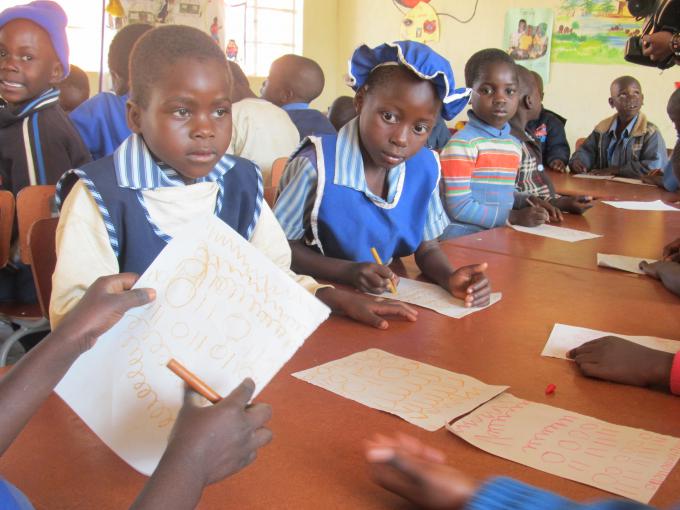Education
Save the Children (SC) education work in Zimbabwe started in 1983. The strategy of SC is to support the Ministry of Primary and Secondary Education (MoPSE), local authorities and local NGOs in the provision of basic education with a focus on increasing access to basic education.

Save the Children education work is being implemented with the MoPSE Head Office in Harare and eight district education offices (Rushinga, Mbire, Gokwe North, Gokwe South, Binga, Hwange, Beitbridge and Matobo). We have a strategic partnership with the University of Zimbabwe on teacher professional development and the Leonard Cheshire Development Trust of Zimbabwe on promoting inclusive education. On teacher professional development, Save the Children is working with the University of Zimbabwe, teachers colleges, a group of primary school teachers and the MoPSE on improving the teaching of reading and numeracy skills in the districts where it operates.
The thrust of the education programme work is to contribute to improved learning outcomes in the primary school using strategies and evidence gathered in its work with strategic partners, MoPSE and schools in Early Childhood Development (ECD) and primary schools.
Early Childhood Development (ECD)
Zimbabwe made enrolment in Early Childhood Development (ECD) centres government policy in 2004. Over the last few years, there has been a steady increase in the ECD enrolment. There is joint work with MoPSE ECD district trainers, schools and communities on raising awareness on benefits of ECD for learners, building capacity of School Development Committees (SDCs) and schools to put up ECD play centres, make learning materials and in some cases providing assistance in the construction of standard ECD classrooms. These activities are helping increase ECD enrolment and participation of communities in the education of their children from early ages. In some places, we are noting increased community participation on ensuring the ECD learners get a nutritious meal. This community initiative is leading to increased enrolment in some areas. SC is now working with partners to gather evidence on the benefits of providing ECD education for learners and impact in the early years of the child’s development.
Basic Education
Zimbabwe has made great strides to achieve Universal Primary Education. Over the years, more and more marginalised children are getting access to basic education. The government programmes such as the Basic Education Assistance Module (BEAM) have helped to reach this high percentage. SC programme seeks to make a difference in two ways. One of these ways is the reach to children who are not in school because they live in remote places far away from schools and children with disabilities. SC is working with MoPSE on supporting children with a range of challenges to access education. Some of them are supported with spectacles, hearing aids, Braille machines among other devices. The other way in which SC is seeking to make a difference to the education of children is improving learning outcomes. SC is working in partnership with strategic partners to improve learning outcomes. This work makes SC involved in a holistic approach called Quality Learning Environments (QLE). Through the QLE approach, SC is working with MoPSE, teachers, communities and other stakeholders to improve the quality of the learning environment to impact on the learning outcomes.
Quality Learning Environment (QLE)
SC is implementing the QLE approach that works as a planning tool with benchmarks and monitoring that ensures delivery and achievement of desirable learning outcomes. The QLE approach has 4 guiding principles. The first principle focuses on learning environments that ensure children’s emotional and psycho-social protection. The monitoring tool leads to interventions that ensure a school free of child abuse and discrimination; that encourages a child friendly complaints reporting system or feedback in place. The second principle revolves around the physical safety of the school environment. This implies that the school programme should be inclusive and meet the physical well being of learners by providing such facets as suitable and appropriate infrastructure, portable water and safe play areas. School health, hygiene and nutrition programmes are also critical in this instance. The third principle is about the learning environment’s capacity to allow and promote full and active participation of learners in the learning process. Here, the teacher must ensure active engagement of learners and uses child centred teaching, adaptive to learners’ needs for improved learning outcomes. The fourth guiding principle encourages parents; and local school communities to be actively supporting the children’s learning through involvement in planning, decision making, implementation, monitoring and such related activities to improve education service delivery. This principle clearly sets the tone for parents’ role in supporting their children’s development and education.
The effectiveness of the QLE approach is being tested and tried by SC and a team of researchers through a pilot longitudinal project named ‘I’m Learning Project’.
Numeracy work
SC is working with MoPSE, teachers and the University of Zimbabwe to improve numeracy levels among learners in the primary school. The project is exploring the issues around the teaching and learning of numeracy, materials development, training and mentoring of teachers to be more effective in their teaching and facilitating of learning. Critical to this project is the gathering of evidence in order to trace the impact of the project.
Advocacy
SC Education programme is anchored on strategic partnerships and advocacy activities. Through the Education Coalition of Zimbabwe (ECOZI), SC makes use of all opportunities such as the Education for All campaigns to advocate for increased national budget allocation for education in line with the targets set for the achievement of MDGs, increased access to quality education and zero tolerance to child abuse.
 Zimbabwe
Zimbabwe